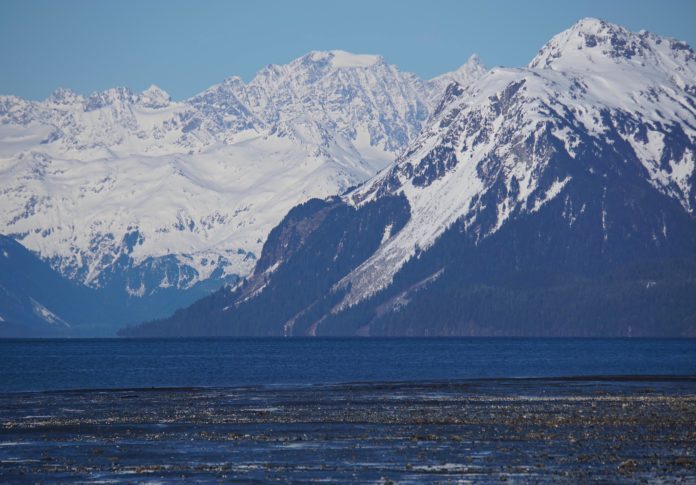
A $45.7 million federal transportation grant for road access to a proposed deep-water port at Shepard Point has been awarded to the Native Village of Eyak, the tribal governing body seeking to provide support for marine accidents, including oil spills in coastal waters of Prince William Sound.
The new Federal Highway Administration’s Nationally Significant Federal Lands and Tribal Projects (NSFLTP) program comes in the wake of a $40.1 million award in January 2021, which NVE said provides sufficient funds for project construction above and beyond planning permitting and design funds provided by the original settlement.
Construction of the anticipated three-year project has not yet begun, as the tribal governing body is in the process of finalizing right-of-way acquisition allowing for construction of the project, said Bert Adams, executive director of NVE. Plans are to solicit requests for proposals in December of 2022, Adams said.
“Road construction and access will begin once the right-of-way has been acquired,” he said. NVE is working with the Alaska Department of Transportation and Public Facilities on right-of-way acquisition from Eyak Corp. and Chugach Alaska Corp. This project will likely include two years in the field and a third year of construction with associated economic benefits, he said. Adams declined comment on the potential overall economic impact of the project.
The only current contractors engaged by NVE are the engineering design and environmental consultants, Adams said. Later this year NVE intends to issue a Construction Management General Contractor (CMGC) request for proposal for a construction contractor for the project, he said.
The project is one of the largest Alaska tribal construction projects funded recently by the federal government. NVE credited Senators Lisa Murkowski and Dan Sullivan, along with the late Rep. Don Young, all R-Alaska, as instrumental in securing the money. The project was one of three such facilities identified in the Exxon Valdez Oil Spill Consent Decree to be constructed to protect Prince William Sound in the event of a marine transportation of other accident requiring expeditious access to response vessels and materials. The other two facilities have already been constructed.
“The tribal members of the Native Village of Eyak have been stewards of the region for thousands of years,” said Mark Hoover, chairman of the tribal entity. “It is appropriate that we are the ones that take the steps to protect the lands and oceans. It is our responsibility to be good stewards of the region and protect our cultural heritage for the future.”
The project is, however, opposed by some area residents, notably those affiliated with the Eyak Preservation Council (EPC).
“The Shepard Point project has always been about NVE’s dream to turn Cordova into a port city in the name of oil spill response, against the public will,” said Dune Lankard, an Eyak Native affiliated with EPC. “This is a perfect example of “sovereignty for sale” because without NVE’s willingness and eagerness to sell the Eyak people’s sovereignty and our right to self-determination thus unnecessary multi-million-dollar bad port and dangerous road project would not of gone anywhere.”
“There is not one regional or Prince William Sound spill and emergency response organization confirming that Shepard Point is ‘the optimal location to respond to future oil spills or other offshore environmental catastrophes,” said Carol Hoover executive director of EPC. “Hundreds of individuals, organizations and the fishermen of Cordova have spoken out and formally commented against the Shepard Point port and road project,” she said. Hoover had also previously questioned the potential danger of avalanches and landslides in the area of the project.
Cordova lost its deep-water port due to the uplift during the 1964 Good Friday earthquake. NVE officials said the need for a deep-water port at Shepard Point became more evident during the 1989 Exxon Valdez oil spill, when the Valdez airport was often shut down for days at a time and Cordova’s all-weather airport was not as useful because of the inability to deploy response supplies onto the water.
That oil spill on March 24, 1989 occurred when the Exxon Valdez an oil supertanker, owned by Exxon Shipping Company, bound for Long Beach, California struck Bligh Reef in Prince William Sound, spilling 10.8 million gallons of crude oil over the next few days. The reef was clearly marked on maritime maps. The cleanup was delayed in part because of the time it took to locate supplies stored in Valdez for response to just such an incident. Waters were relatively calm at the time of the spill, but over the next few days the weather changed and the spilled oil spread rapidly, killing salmon, sea otters, seals and other marine wildlife, and causing extensive environmental damage.
NVE officials said the FHA grants reflect the federal administration’s emphasis on allowing tribal members and the broader community to develop marine support services in their regions. Tribes may apply for 100% funding from the federal government with no matching requirement. The grant provides federal funding for construction reconstruction or rehabilitation of multi-model transportation facilities that are being constructed within adjacent to or provide access to federal or tribal lands.
More background information on the project from NVE is online at https://www.shepardpointoilspillresponse.com/who-we-are





